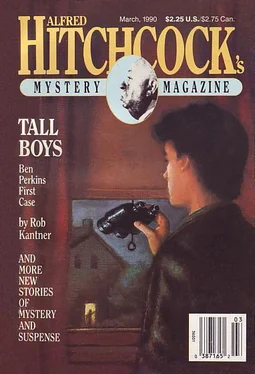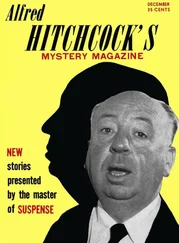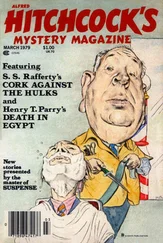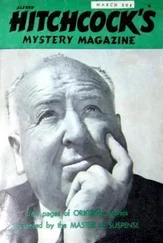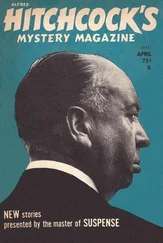Роберт Стивенсон - Alfred Hitchcock’s Mystery Magazine. Vol. 35, No. 3, March 1990
Здесь есть возможность читать онлайн «Роберт Стивенсон - Alfred Hitchcock’s Mystery Magazine. Vol. 35, No. 3, March 1990» весь текст электронной книги совершенно бесплатно (целиком полную версию без сокращений). В некоторых случаях можно слушать аудио, скачать через торрент в формате fb2 и присутствует краткое содержание. Город: New York, Год выпуска: 1990, ISBN: 1990, Издательство: Davis Publications, Жанр: Детектив, на английском языке. Описание произведения, (предисловие) а так же отзывы посетителей доступны на портале библиотеки ЛибКат.
- Название:Alfred Hitchcock’s Mystery Magazine. Vol. 35, No. 3, March 1990
- Автор:
- Издательство:Davis Publications
- Жанр:
- Год:1990
- Город:New York
- ISBN:0002-5224
- Рейтинг книги:4 / 5. Голосов: 1
-
Избранное:Добавить в избранное
- Отзывы:
-
Ваша оценка:
- 80
- 1
- 2
- 3
- 4
- 5
Alfred Hitchcock’s Mystery Magazine. Vol. 35, No. 3, March 1990: краткое содержание, описание и аннотация
Предлагаем к чтению аннотацию, описание, краткое содержание или предисловие (зависит от того, что написал сам автор книги «Alfred Hitchcock’s Mystery Magazine. Vol. 35, No. 3, March 1990»). Если вы не нашли необходимую информацию о книге — напишите в комментариях, мы постараемся отыскать её.
Alfred Hitchcock’s Mystery Magazine. Vol. 35, No. 3, March 1990 — читать онлайн бесплатно полную книгу (весь текст) целиком
Ниже представлен текст книги, разбитый по страницам. Система сохранения места последней прочитанной страницы, позволяет с удобством читать онлайн бесплатно книгу «Alfred Hitchcock’s Mystery Magazine. Vol. 35, No. 3, March 1990», без необходимости каждый раз заново искать на чём Вы остановились. Поставьте закладку, и сможете в любой момент перейти на страницу, на которой закончили чтение.
Интервал:
Закладка:
I realize now that those presents must have been a pledge more to himself than to Mama and me that there was a time and world unbounded by gray North Atlantic waters and deadly U-boats. In later years he was such a silent, preoccupied, just-there father that I forgot how perceptive his gifts had been.
I asked him once to tell me how mermaids ran and was crushed when he explained the difference between the glittering mermaids I’d imagined and the grim actuality of the Murmansk Run. But weeks later, he sent back a tiny wooden mermaid scaled with golden sequins.
That day, Mama lifted the square green bottle from its nest of tissue and let me touch the exquisite ceramic roses. Then she smoothed some perfume on her bare white arms and lay back upon the rug, her eyes closed; and while chill March rains streamed down the windowpanes, the room filled with the heavy languorous scent of full-blown roses under a hot June sun.
“What does this say?” I asked, tickling her nose with the note that had fallen out. She opened her eyes, crossed them for my benefit, and read, “ ‘This reminded me of the day we met.’ ”
“Didn’t you always know Daddy?” I asked, as much in surprise as to prolong her mood.
“I was the original farmer’s daughter,” she answered fliply. She gazed around the spacious rooms with their deep rugs and polished tables and Sadie clattering out in the kitchen beyond many closed doors. “Luckily for me, he wasn’t a traveling salesman.”
I held my breath, hoping she would go on. She so seldom forgot that I was a child. She lay on the rug looking up at the ceiling with dreamy eyes and let me see her as she’d been that hot summer day when Daddy drove by in the first yellow convertible she’d ever seen.
Sweaty and barefoot, she’d just hoed to the end of a long tobacco row when Daddy tapped his horn and asked if he were on the Raleigh road. He wasn’t, but before he could turn the car, its radiator boiled over.
“Your Uncle Paul was only sixteen and practically pushing his mule and plow down the furrow, just dying to see that car up close.”
One good look at Mama with her long black hair hanging free beneath a faded straw hat, and Daddy couldn’t seem to get his yellow convertible started.
He accepted Grampa’s invitation to a cold glass of sweet tea and would have maneuvered to stay for supper if Uncle Paul, tempted beyond the limits of good manners, hadn’t slipped down the lane in the growing dusk and started the car with no trouble. Mama walked down the lane with him, pausing in the twilight to pick a cluster of Gran’s climbing roses.
“They were still warm from the sun and your daddy took them and said he was sure he could get lost again the next week if he tried. Anyhow, we got married right after barning season.”
She was eighteen.
It was better than a fairy tale and Daddy was Prince Charming. I was so full of love for them both that I hugged Mama hard. She squeezed me absently, then got up and stood before the mirror above our marble fireplace. She tucked stray ends of her black hair back into its smooth pageboy.
“I’m twenty-five years old and just look at me! My life’s half over and nothing’s happening. Oh, Libby, your daddy’s been gone so long and this old war’s never going to end. I’m so tired of being lonesome!”
I could have wept for her; but Sadie came in just then, her small frame draped in a long raincoat, to tell Mama our lunch was ready. With Daddy gone, there wasn’t enough work to fill Sadie’s day, so Mama made her leave at noon.
She would have dispensed with Sadie altogether if Daddy’d let her because she felt Sadie blamed her for all the changes the war had made: Daddy’s absence, the parties no longer given, the other maids lured away by higher factory wages.
But things had been changing for our family long before this latest war. Once the whole northwest quadrant of town had been Watson land; now our house stood on less than a hundred acres of overgrown pasture and scrub woodland. A hundred acres out of all those thousands, and what had been an isolated country estate was increasingly threatened by gas stations, factories, and truck-filled highways as the town pushed north and west and began to act like a city.
As the youngest Watson, I didn’t mind the encroachment. A ten minute walk along neglected bridle paths brought me out to the highway where a small general store sat between two truck depots. Sugar rationing or not, one glass case was always heaped with penny candy, and if I didn’t have a penny, one of the drivers lounging there between runs would usually treat a little girl if she looked wistful enough. At four-going-on-five, I’d barely heard of Shirley Temple or Margaret O’Brien, but already I knew instinctively how to lift my blue eyes to those male faces and get what I wanted.
That’s where I met Jethridge. He gave me cinnamon jawbreakers and dizzying, heart-stopping rides on his Harley-Davidson motorcycle. In one truck yard, around the store, and back through the other yard. Most of the truckers were too old for the army, but Jethridge was youth and laughter and swaggering masculinity in a black leather jacket studded with bright nailheads and chips of red glass. He made a pet of me, and as I ran through the lane, jumped the ditch, and darted across the cement road, I always hoped he’d be there, back from Nashville, Atlanta, or Lexington.
He was there the day after Daddy’s perfume came, and when I tripped on the doorsill and fell sprawling on the planked floor with a skinned knee, it was Jethridge who picked me up and took me home.
He placed me on the back of his glittering machine as if I were a princess and I clasped him tightly around his waist and laid my cheek against the cold leather of his jacket. It smelled of motor oil and hair tonic as we roared along the highway. He throttled down as we came to the end of our long driveway into the yard, but Mama heard and came out onto the porch.
“Carry me,” I coaxed and was swooped up in his arms again. For one aching moment, I longed for my own daddy; then Mama was there with worried questions as Jethridge carried me into the house.
She removed a splinter and cleaned my knee, but before she could ease him out of the house with polite dismissive thanks, I put on my prissiest Watson manners, which always amused her. “You must allow us to repay your courtesy, Jethridge.”
That was the first time, and if Sadie didn’t approve of serving coffee to leather-jacketed truck drivers in our living room, she kept it to herself.
Or tried to.
Jethridge must have noticed, though, for when he stopped by to ask how I was the next day, it was after Sadie had gone.
Mama sparkled that afternoon, gayer than I’d seen her since Daddy left, and her dimples flashed when Jethridge said, “Now I see where Libby gets her charm.” I made him tell her my favorite trucking stories, and Mama laughed as much as I did.
I was central and necessary those first few days until the phone call about Uncle Paul made Mama cry. When I returned from the store with my candy, something in the relationship had shifted — a sudden tension in the air which didn’t include me. Later, though, as I lay in bed, their voices floated up the stairwell and I could hear Mama’s careless laughter and the familiar swagger in Jethridge’s tones. The whole house seemed to drift on a sea of warm June roses and I fell asleep reassured.
April set a new pattern for our days: Mama no longer let me go to the store, but Jethridge made up for it by spending most of his layover times with us. Soon after Sadie left each day, we’d hear the pop of his motorcycle and I’d race across our wide porch and down the steps to fling myself upon him and rifle his pockets for the jawbreakers he kept stashed for me. Then he’d swing me up be hind him, and we’d roar through the old bridle paths, avoiding Sadie’s cottage on the far side of the land, to end up in a skid by the porch where Mama waited with mocking laughter. “Four-year-olds, the both of you!”
Читать дальшеИнтервал:
Закладка:
Похожие книги на «Alfred Hitchcock’s Mystery Magazine. Vol. 35, No. 3, March 1990»
Представляем Вашему вниманию похожие книги на «Alfred Hitchcock’s Mystery Magazine. Vol. 35, No. 3, March 1990» списком для выбора. Мы отобрали схожую по названию и смыслу литературу в надежде предоставить читателям больше вариантов отыскать новые, интересные, ещё непрочитанные произведения.
Обсуждение, отзывы о книге «Alfred Hitchcock’s Mystery Magazine. Vol. 35, No. 3, March 1990» и просто собственные мнения читателей. Оставьте ваши комментарии, напишите, что Вы думаете о произведении, его смысле или главных героях. Укажите что конкретно понравилось, а что нет, и почему Вы так считаете.
